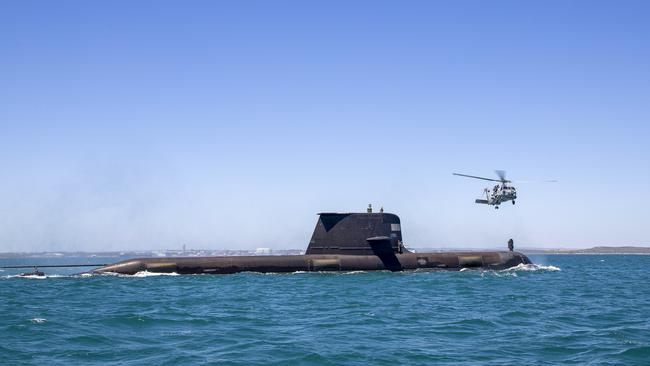Up periscope: where exactly are we going?
The decision on nuclear-powered submarines crystallises a cultural issue facing modern Australia: our capacity to plan for the future.

Australia’s decision to scrap the French submarine contract in order to build nuclear-powered subs with alliance partners crystallises a cultural issue facing Australia in the 21st century: our capacity to plan for the future.
The deterioration of our strategic position in recent years, associated with the rise of China, has resulted in the major political parties now agreeing that we need this fleet of nuclear-powered subs, which may not be delivered for another 20 years.
Rewind 20 years, and terrorism was regarded as our biggest threat. Indeed, for much of the past two decades China was popularly viewed as a rising superpower that was being slowly Westernised; we naively thought we were winning them over to our way of thinking. To put it bluntly, I think it was beyond Australia’s ken in 2001 to conceive of China as a credible medium-term threat – at least to the extent that we should seek access to nuclear propulsion technology and begin a construction program that would take decades to complete. There would also have been the hurdle of convincing the Australian people at that time of the need to “go nuclear”; I don’t think emphasising “nuclear for propulsion only” would have made any difference to the outcome.
The really tricky bit with big-picture planning is staying the course over multiple administrations. Let’s say that somehow the Australian government set all this up 20 years ago, so that the first subs would roll off the production line in Adelaide later this year. Perfect timing! The reality is that Scott Morrison is the seventh prime minister we’ve had since 2001. Do you really think, assuming we had the foresight to put in place the systems needed to deliver these subs today, that there would not have been tinkering – let alone “an inspirational change of direction” – over this timeframe?
I’m not sure we have the focus required to deliver such a project across multiple administrations. Or at least not without changes at a political and cultural level, including an improvement in our capacity to openly and without rancour discuss future threats to our way of life. In order to do this we have to first agree that our Australian way of life is valued, is worth making sacrifices for, and that our institutions can be trusted across multiple electoral cycles.
Let’s go back to 2001 and consider what else we might have put in motion. Perhaps we should have foreseen the probability of longer, more devastating droughts – and committed to building desalination plants outside each capital city not during a drought, but before. Perhaps we should have planned for the possibility of a global pandemic, and built quarantine facilities outside each capital city.
We did get one thing right in the 2000s: kicking off the national broadband network. It cost us a great deal and unfolded across several administrations (with tinkering, of course), but has proved essential in maintaining our economic output during the pandemic. Without it, working and schooling from home just wouldn’t have been possible.
The cultural issue exposed by the subs saga is that it’s not possible to plan for, let alone to provision and budget for, every contingency. But what we can do is create an Australian culture that is agile and open to change. We may need to lease subs. We’ll need the diplomatic goodwill to create alliances. But perhaps above all we need to foster a society that is open to lateral thinking, and to respectful and challenging debate about the Australia we want for the future.




To join the conversation, please log in. Don't have an account? Register
Join the conversation, you are commenting as Logout